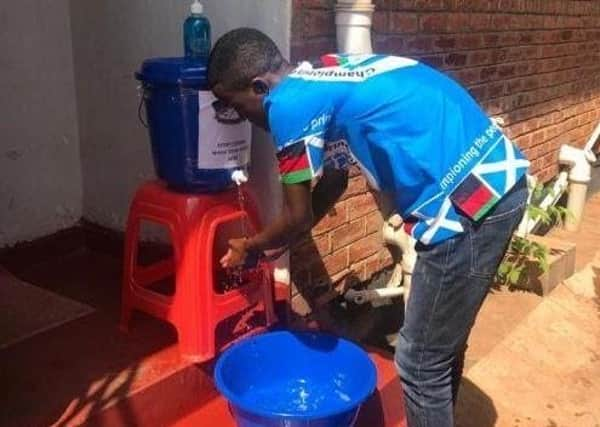Health and welfare can no longer be understood through the lens of the nation state – David Hope-Jones


Malawi, the small landlocked African nation with which Scotland has a uniquely strong relationship, was one of the last countries in the world to confirm the arrival of Covid-19: two months after the UK. Roughly two weeks before its first case was announced, the President declared a national emergency and enforced a quarantine for all international arrivals. This swift action may have had significant impact, as Malawi’s Covid-19 numbers remain remarkably low: 730 known cases and 11 deaths in the 12 weeks since the first case was declared. But they are starting to rise and the judiciary’s overturning of lockdown and mass rallies in the run up to the 23 June Presidential election may be the reason.
We all hope that Malawi’s Covid-19 numbers remain low: perhaps the result of a different climate, geography or, most likely, demography. Malawi has an incredibly young population, with half the country under the age of 17 and only three per cent 65 or older.
Advertisement
Hide AdAdvertisement
Hide AdSadly, we cannot be complacent. It is likely these numbers are very significantly under-reporting the true prevalence of the virus across the country, with around 6,000 tests having been conducted, nationwide, at the time of writing. The pandemic may develop in a different way in Malawi, compared to the UK, but it will develop.


It has been a great privilege to have hosted a regular series of Zoom meetings since March, bringing together those in Scotland and Malawi fighting Covid-19 in both our countries. These Scottish Government-funded meetings have often been fully booked, with over 100 organisations and key individuals signing up to share their updates and learning, and help coordinate how best we work together for maximum impact. This is a unique crisis because it is one we are both suffering concurrently. It is therefore more important than ever to create a space for shared learning, partnership working and mutual solidarity.
It has been hugely inspiring to hear from those in Malawi fighting Covid-19, both the doctors and nurses on the frontline and those senior officials heading the national response. It would be easy to imagine a sense of fatalism creeping in for healthcare leaders in a country which has fewer than one ventilator per million people, as they watch well-funded European health systems strain under the pressure. But this has not been the case in Malawi, they have, generally, used the extra time they have had to build their preparedness.
It has also been wonderful to see how many in Scotland have stepped up to the challenge, despite the huge pressures here, to support their friends in Malawi. We have seen churches across Scotland working with their Malawian partners to support healthcare messaging, using the scale and depth of faith networks to reach even the most rural and remote communities. We have seen schools supporting their partners with basic but essential hygiene and handwashing equipment. We have seen dozens of Scottish charities, large and small, developing significant programmes to support the production, distribution and correct use of essential personal protective equipment.
If Covid-19 has taught us anything it must, surely, be our collective interest in, and responsibility for, global health. Our health and welfare can no longer be understood through the lens of the nation state. A virus that started in a wet market 5,400 miles away from Scotland has negatively impacted the lives of all 7.8 billion of us globally.
It is no longer possible to simply accept that Malawi has 40,000 people per doctor, compared to the UK’s 400. Such gross inequalities in healthcare must be made a thing of the past. We must fight, harder than ever, to maintain our commitment to international development (just 0.7 per cent of UK Gross National Income). The merging of the UK Government’s Department for International Development with the Foreign Office is undoubtedly a backwards and dangerous step, as aid will increasingly be seen as a means to advance the UK’s political, commercial and security interests.
In this context, it is right to champion the innovative, distinctive and effective approach Scotland has chosen to take with Malawi, encouraging others to follow. As a country, Scotland has rejected the idea of aid as a tool of soft power for our own self-advancement. We have also rejected the, often patronising, paradigm of pity and one-way charity: “we, the wise benevolent, give to the passive, grateful recipient”. Instead, we have developed an approach to international development underpinned by dignified two-way partnership, which inspires collective action from every section of civic life in both nations.
There is strong public and cross-party support for our work with Malawi. We have thousands of organisation-to-organisation, community-to community and people-to-people partnerships between our two nations, each often modest in scale when taken individually but, together, a powerful force for good.
Advertisement
Hide AdAdvertisement
Hide AdThrough this inspiring spirit of friendship and solidarity we have worked together as two nations to meet, what is (I hope), the defining challenge of our time. Our fight, together, against Covid-19 is not over but, when it is, I believe Scotland and Malawi will be able to look back with pride at the spirit of partnership which underpinned our mutual success.
To learn more about Scotland-Malawi Covid-19 cooperation, visit: www.scotland-malawipartnership.org/covid-19.
David Hope-Jones OBE, Chief Executive, Scotland Malawi Partnership
Comments
Want to join the conversation? Please or to comment on this article.